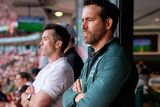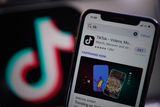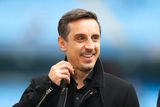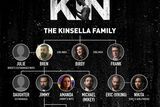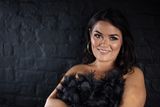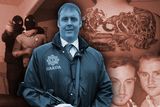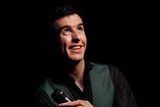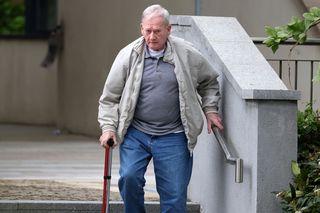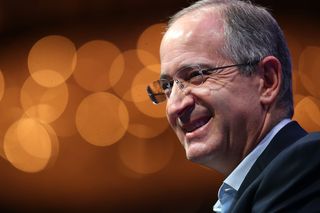JK still leaves her readers spellbound
On the 20th anniversary of the publication of the first Harry Potter novel, Jonathan deBurca Butler examines JK Rowling's inspiring tale of courage and determination
In the midst of the media melee and fallout from the astounding UK general election result came an arresting tweet: "Just unfollowed a man whom I thought was smart and funny, because he called Theresa May a whore." The tweet was posted by JK Rowling and continued for another 14 tweets. "If you can't disagree with a woman without reaching for all those filthy old insults," she continued, "screw you and your politics."
This was not the first time the author had caused a stir on the social media platform. During the last general election in the UK, the legendary writer - who lives in Scotland - was subjected to online abuse in which she was referred to as "a traitor to Scotland" and "Blairite scum" for her support of the Labour Party. She spoke out against the abuse and did so, she explained, because she believed in "standing up to bullies".
Twenty years ago tomorrow, a bespectacled boy wizard first appeared in Harry Potter and the Philosopher's Stone. He was courageous and had backbone, much like his creator. That bravery is probably Rowling's most enduring quality and perhaps the reason she is so popular.
In 2010, a YouGov poll of people over 16 years of age for AOL found she was the celebrity whom most women wanted to be. She polled almost seven times as many votes as the British Queen and 26 times more than Jordan (Katie Price).
JK Rowling and her husband Dr Neil Murray
Her place in global culture and influence is remarkable, given where she found herself just before the release of her first Potter novel.
Joanne Rowling was born just outside Bristol on July 31, 1965. Her parents were relatively well-off. Her father, Peter, was a Rolls-Royce engineer, her mother, Anne, was a scientist and teacher. From early on, Rowling wrote fantasy stories which she would read to her younger sister, Dianne. At secondary school, an English teacher remembered her as being "not exceptional" but "one of a group of girls who were bright, and quite good at English". She clearly had some talent. But as her life progressed, things became more complicated.
Life at home was, by her own account, quite difficult, not least because of her mother's multiple sclerosis. "She always seemed very young," she said of her mother in an interview with The Telegraph. "She was very fit, she was a non-smoker, non-drinker, and I say all of this because, of course, then for her to be diagnosed at 35 with an illness that would kill her was just the most enormous shock to us and everyone who knew her."
Anne's death in 1990 at the age of 45 marked the beginning of a period in Rowling's life that saw her go from rock bottom to superstardom.
Six months before her mother's death, Rowling was travelling on a train from Manchester to London when it was delayed. As she sat there, the story of a boy who goes to a school of wizardry came to her. The moment she arrived in London, she began to write about Harry Potter and much of the loneliness and hurt that Rowling was feeling at the time over her mother's death was channelled into him.
Rowling moved to Portugal in the early 1990s. She planned to teach English in the evenings and write in the afternoons. She was disciplined. Not even her romance and subsequent marriage to journalist Jorge Arentes could stop that. The marriage did not last long and Rowling returned to the UK with three chapters of Harry Potter completed and a six-month-old baby daughter, Jessica. Suddenly Rowling found herself on the breadline, living on £70-a- week in a small flat in Edinburgh. For a long time, the story went that she would go to cafes just to keep warm. She later debunked those stories, suggesting instead that they were the only places where her daughter would sleep and therefore where she could write.
"I was as poor as it's possible to be in this country," she has said. "I was a single parent. The key phrase is 'in this country', because we have a welfare state. I knew perfectly well that I was walking into poverty, which, as I soon found out, is a lot like childbirth; you know that it's going to hurt before it happens but you'll never know how much until you've experienced it. Some articles written about me have come close to romanticising the time I spent on Income Support, because the well-worn cliche of the writer starving in the garret is so much more picturesque than the bitter reality of living in poverty with a child and experiencing the endless little humiliations of life on benefits."
She has given accounts of getting to checkouts and finding herself pennies short of the price of a tin of baked beans and of dressing her daughter Jessica from charity shops.
As if that were not complicated enough, Jorge turned up in Scotland looking for his daughter. The easy way out would have been to return to Portugal with him. Instead, Rowling had a restraining order taken out against him, and in August 1995, she filed for divorce.
All the while, she worked on her hero until she finally found an agent, Christopher Little. Initially, her manuscript was rejected by scores of publishing houses but, finally, her luck changed.
Little called at Bloomsbury Publishing's cramped offices in Soho Square in London and handed a sample chapter to chairman Nigel Newton. Newton took the short manuscript home but, instead of settling down with it himself, he gave it to his eight-year-old daughter Alice to read.
"She came down from her room an hour later glowing," Newton recalled in an interview with The Independent, "saying, 'Dad, this is so much better than anything else'.
"She nagged and nagged me in the following months, wanting to see what came next."
Newton decided to take Rowling on and wrote her a cheque for just £2,500. "It was very fortunate for us," recalled Newton. "We'd only just started to publish children's books in June 1994 - and we hit it lucky."
An initial 1,000 copies sold slowly and even the winning of that year's Smarties Book Prize did little to boost sales. More awards followed, however, and now the industry began to sit up. In the US, Scholastic Inc. paid $105,000 for publishing rights across the Atlantic and this afforded Rowling the opportunity to move into better accommodation.
Its sequel, Harry Potter and the Chamber of Secrets, was published in July 1998, and again, Rowling won the Smarties Prize. Rowling became the first person to win the prize three times running with her third novel, Harry Potter and the Prisoner of Azkaban (published in July 1999).
Something of a frenzy had now begun to develop. Harry Potter and the Goblet of Fire was released simultaneously in the UK and the US on July 8, 2000, and broke sales records in both countries.
An amazing 372,775 copies of the book were sold on its first day in the UK, almost equalling the number which the Prisoner of Azkaban sold during its first year. In the US, the book sold three million copies in its first 48 hours, smashing all records.
There was success too for Rowling in love. It was at about this time that she met Neil Murray, a 28-year-old Scottish doctor who, newspapers noted, had boyish looks and wore round glasses. The couple would marry in a private ceremony on St Stephen's Day, 2001. Just 15 people were in attendance, and her daughter Jessica and Rowling's sister Dianne were bridesmaids. Caterers and other contractors for the event were brought in from 50 miles outside Edinburgh and guests were sworn to secrecy.
Rowling is fiercely protective of her privacy and has gone to great lengths to protect it. In 2008, she and her husband brought a privacy case under the European Convention Human Rights on behalf of their son, David. In dispute was a photograph of the couple walking on an Edinburgh street, pushing David in a buggy, which was taken by a picture agency in November 2004 and printed in a magazine five months later. At the time, David was just one-and-half and Rowling was six months pregnant with the couple's daughter, Mackenzie. The picture was taken without permission and using a long lens.
After an appeals court found in their favour, the couple issued a statement: "We embarked on this lawsuit not because we were seeking special privileges for our children but because we wanted them to grow up, like their friends, free from unwarranted intrusion into their privacy."
The strain of having a young family while being a surrogate mother to the world's most popular boy hero began to tell on Rowling. There was speculation that she was suffering from writer's block (in all likelihood, she was just being a parent) but nonetheless her fans wanted more. Eventually they got what they were looking for, and with the movie franchise in full flight, Harry Potter went into the stratosphere.
The three remaining books in the series would end up breaking their own records, with the seventh and final book, Harry Potter and the Deathly Hallows (2007), selling a staggering 11 million copies in the UK and US in the first 24 hours.
By the end of it all, Rowling had gone from £70-a-week to being worth an estimated €680m.
But rather than measuring Rowling's value in purely monetary terms, it is worth looking at what she has contributed to society. She is well-known for her charity work and has started, or is a patron of, several charities - many of them aimed at helping children. But more than anything perhaps, Rowling encouraged a generation to read.
Ireland was no exception.
"I think for us in Eason, O'Connell Street 2005 was the moment you sort of sensed there was something different," says David O'Callaghan, Head of Children's Books in Eason. "It was the first midnight opening and the idea of doing that for a children's book before was unthinkable really. And what you could see with this one was that adults were bailing in to read the books too. And then on July 21, 2007, 2,000, people turned up at a midnight opening in Dublin. I mean, it was across the globe but that was huge. Publishers began to take notice really because you had kids who before then didn't want to read and now wanted to read everything."
Reading was no longer the pursuit of the geek or, as O'Callaghan puts it, "the bookworm". Reading became the norm. The movie industry had had Star Wars, tech had had Tamagotchi, Game Boy and Nintendo, and now reading was having its moment.
Not only was Harry Potter a phenomenon all of its own but it was the catalyst for others. Children's Books was split up into sub-categories from which blossomed yet more genres.
O'Callaghan's assessment is insightful: "There wasn't really any Teen-Young Adult literature," he says, "and if you look at the last two Harry Potters in particular, everything got a bit darker and moodier.
"When we did those midnight openings, we all thought we'd never see anything like it again but little did we know that Twilight was just around the corner and there was The Hunger Games and then John Green. So that whole Young Adult development happened and it was a natural progression; the Harry Potter readers were moving on and into Paranormal, Romance and Dystopia. The movie would come out and everyone in the class was following it, and then they'd move on to the next contemporary fiction and when you trace it all back, it all starts really with Harry Potter. You've got this whole wave of Young Adult authors who are inspired by Harry Potter."
Of course, not everyone has stayed with Rowling. As she has become more outspoken, she has lost one or two fans along the way.
During the recent US Presidential race, the author was highly critical of Donald Trump. Disillusioned Rowling followers and Trump supporters responded by telling the author they had burned her books and DVDs.
"You can lead a girl to books about an autocrat," she replied, "but you still can't make her think."
Ouch.
Join the Irish Independent WhatsApp channel
Stay up to date with all the latest news


